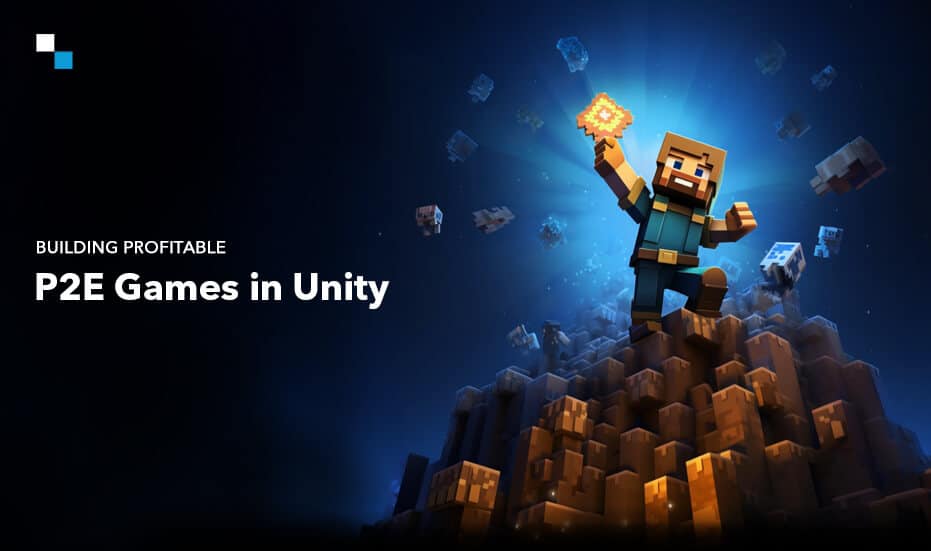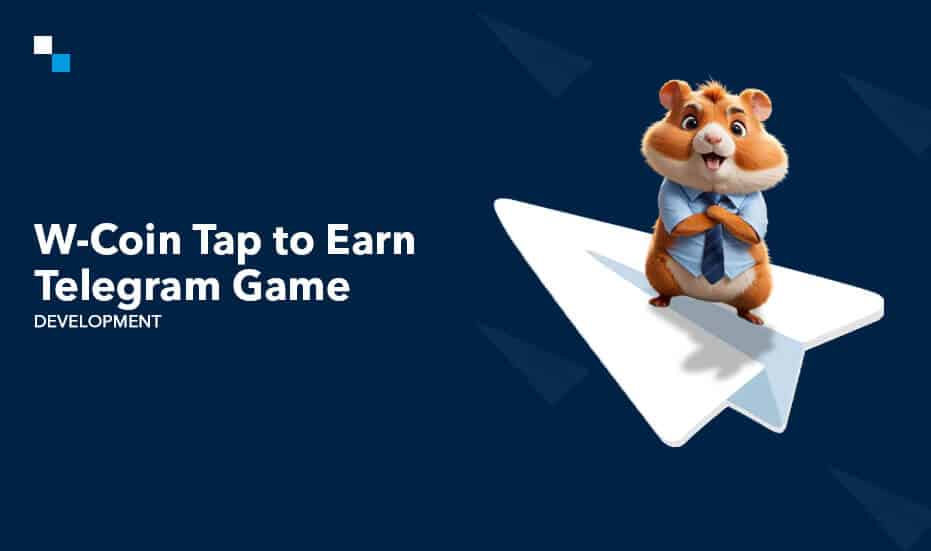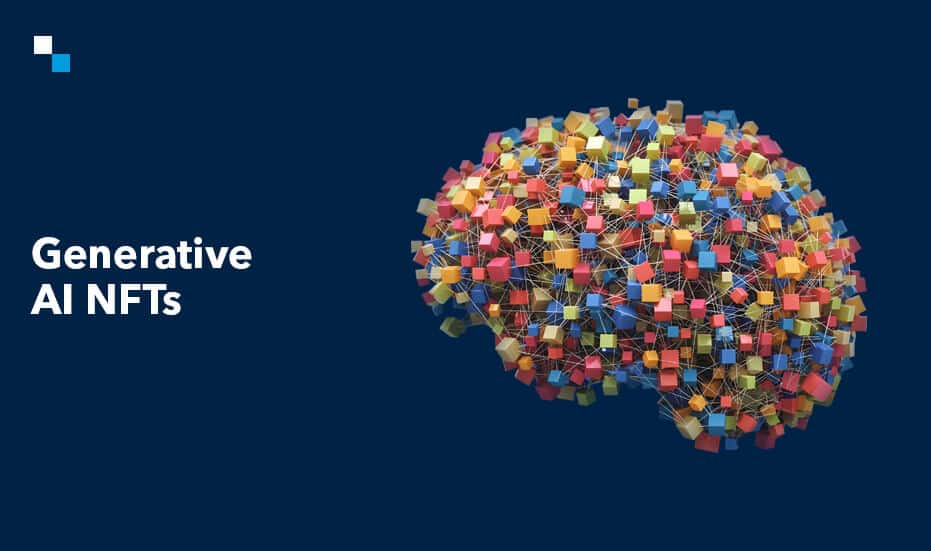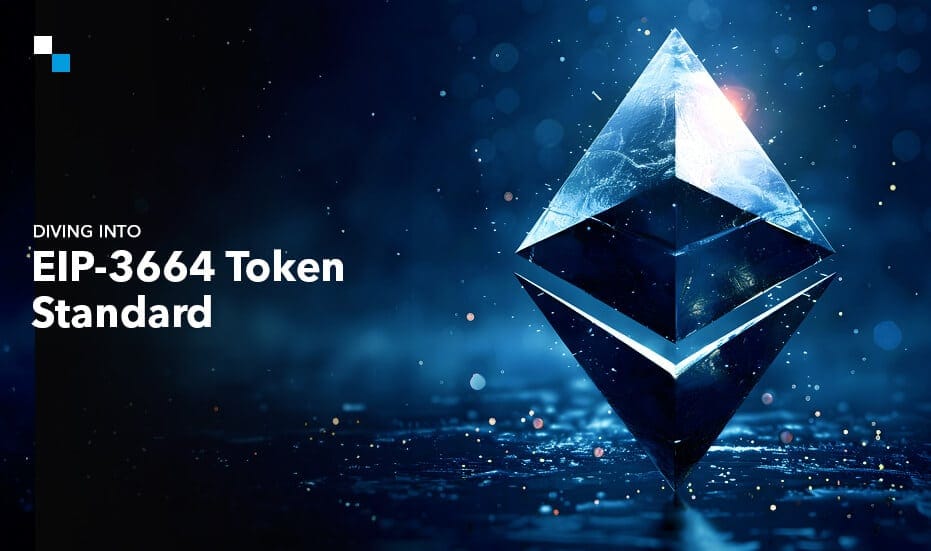
Business Benefits of Launching a Decentralized Exchange
February 7, 2024
Exploring Web3.0 Development Use Cases and Opportunities
February 7, 2024In the dynamic world of gaming, modern gamers find themselves in a whole new experience where leisure intertwines with financial opportunity. The popularly known play to earn game development enables gamers to transmute gaming prowess into real-world rewards, where each virtual conquest becomes a stepping stone to tangible assets.
Within the economic tapestry of Play-to-Earn, collaborative ventures take center stage. Businesses craft partnerships with influencers and brands, creating a harmonious symphony within the vibrant gaming community. As gamers actively participate in this emergent digital economy, businesses evolve into contributors and beneficiaries, marking a transformative journey that extends beyond gaming dynamics to a realm of unparalleled possibilities while you develop a P2E game.

Why P2E Game Development is Gaining the Momentum?
The influence of play to earn games isn’t just confined to rewards and entertainment. It is accompanied by countless far-reaching implications for players, developers, and modern businesses. Here are the major reasons why play to earn game development services are becoming increasingly popular.

Benefits of Play to Earn Games for Players
- Empowerment and Ownership
- Real-World Rewards
- Community Building
- Transparent and Secure Transactions
Benefits of Play to Earn Games for Developers
- New Revenue Models
- Engaged Player Base
- Innovation and Experimentation
- Innovative Gameplay Dynamics
Benefits of Play to Earn Games for Businesses
- Partnerships and brand exposure
- Monetization Opportunities
- Economic Ecosystem Contribution
- Increased User Retention
How do Play to Earn Games Work?
P2E game development services redefine traditional gaming by introducing tangible value through blockchain technology. Envision immersing yourself in your favorite game, where, instead of mere virtual rewards, you accumulate tokens or cryptocurrencies with real-world value. These tokens, often linked to NFTs representing your in-game assets, can be traded on marketplaces or utilized within the game’s economic framework.
This establishes a cycle where playing yields tokens, tokens enable the acquisition of superior in-game items, and those items, in turn, enhance potential earnings, possibly generating income.
While you build a P2E game, its essential to be aware of its working mechanism.
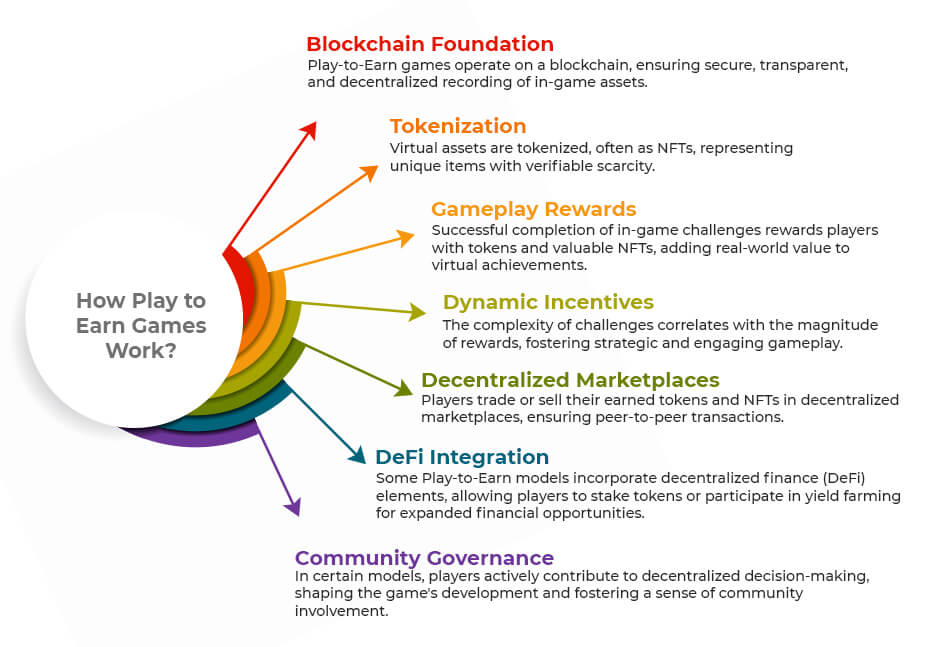
Steps to Develop Play to Earn Games With Unity Engine
Embarking on the P2E game development journey with Unity Engine is a game-changer, driven by its unique advantages. Unity’s cross-platform magic ensures your game reaches players everywhere. With top-notch graphics tools, your game becomes a visual masterpiece. The streamlined development process, backed by a thriving community, makes innovation a breeze.
Unity’s blockchain integration effortlessly weaves in smart contracts and NFT game development, adding depth to the play to earn experience. Scalability keeps pace with your game’s growth, ensuring a secure and dynamic playground. Unity’s flexible monetization options, from in-app purchases to ads, offer a symphony of revenue streams. In a nutshell, Unity is the ultimate stage for Play-to-Earn creativity, where gaming and blockchain seamlessly collide.
Let’s discover the prominent steps on how to build a P2E game with the Unity engine!
1. Game Conceptualization and Design:
- Formulating the Unique Game Concept: Initiate the ideation process to delineate a distinctive game concept, encompassing narrative, gameplay mechanics, and overarching objectives in alignment with the P2E game development paradigm.
- Game Design Document (GDD) Craftsmanship: Develop a comprehensive GDD, serving as the blueprint outlining intricate details such as characters, features, player progression mechanisms, and meticulous monetization strategies.
2. Unity Development Environment Setup:
- Unity Hub Installation: Execute the download and installation process for Unity Hub, a centralized management tool facilitating efficient control over Unity versions and project administration.
- Inception of a New Unity Project: Commence a new Unity project, judiciously configuring settings congruent with the specified game requirements and targeted platform specifications.
3. Asset Production and Integration:
- 3D Model Generation and Animation: Employ advanced tools to generate high-fidelity 3D models, animations, and textures for characters, environments, and assets.
- Sound Engineering: Implement aural elements such as background music, sound effects, and voiceovers, contributing to a heightened and immersive gameplay experience.
4. Blockchain Integration Strategies:
- Blockchain Platform Selection: Undertake a cosmic exploration of blockchain platforms, employing advanced analytics to ascertain the optimal choice based on a celestial alignment of scalability, cost-efficiency, and robust community support – a journey transcending mundane considerations.
- Smart Contract Development: Commence a symphony of smart contract creation and integration, orchestrating a secure and intricate dance that governs in-game assets, transactional cosmos, and the overarching economic galaxy with cryptographic precision.
5. Implementation of Play-to-Earn Mechanics:
- Cryptocurrency Integration: Embed a cryptocurrency or customized token system, facilitating seamless in-game transactions and reward disbursement.
- Sophisticated Reward Systems: Engineer intricate reward systems that dynamically allocate tokens or digital assets based on player achievements, milestones, and sustained engagement.

6. Game Logic and Mechanics Development:
- Gameplay Scripting: Leverage programming expertise to script and code core game mechanics, player interactions, and rule sets, ensuring seamless integration with the Play-to-Earn model.
- Integration of Multiplayer Functionality: Implement advanced features supporting multiplayer gameplay, fostering collaborative or competitive dynamics among players.
7. Cutting-Edge Monetization Protocols:
- Transaction Elegance: Implement an in-app purchase system that transcends traditional norms, ensuring seamless and elegant transactions for players acquiring in-game assets or currency.
- Adroit Ad Integration: Strategically integrate advertisements, leveraging advanced algorithms to optimize placement, timing, and relevance, thereby creating an unobtrusive revenue stream without compromising user experience.
8. Quantum Testing Endeavors:
- Quantum Playtesting Realms: Unleash an unparalleled playtesting regime, utilizing quantum-inspired algorithms to analyze vast permutations, identifying and rectifying even the most elusive bugs and fine-tuning gameplay intricacies.
- Blockchain Resilience Testing: Subject blockchain integration to a battery of resilience tests, simulating real-world scenarios to ensure the robustness and fault-tolerance of in-game transactions under diverse conditions.
9. Orchestrated Deployment Symphony:
- Precision Deployment Protocols: Employ orchestrated deployment procedures, synchronizing the release across multiple platforms with surgical precision to optimize accessibility and user engagement.
- Strategic Techno-Marketing Fusion: Infuse technology-driven marketing tactics, utilizing AI-powered analytics and personalized campaigns to dynamically adapt and refine promotional strategies for heightened visibility.
10. Community Forge and Iterative Tech Evolution:
- Tech-Driven Community Building: Establish community channels utilizing advanced AI algorithms for sentiment analysis and engagement prediction, fostering an inclusive and tech-driven ecosystem around the game.
- AI-Infused Iterative Development: Implement AI-driven feedback analysis, processing player inputs through neural networks to iteratively evolve game features, mechanics, and technical aspects, ensuring a dynamic and responsive gaming environment.
How Much Does it Cost to Build a Play to Earn Game?
Navigate the financial topography inherent to play to earn game development, where costs fluctuate across a spectrum. Variables such as game intricacy, blockchain integration depth, high-fidelity graphics, strategic marketing initiatives, and ongoing maintenance contribute to budgets ranging from moderate figures for simpler projects to substantial investments for complex, feature-rich gaming endeavors.
Other factors that decide the overall cost of play to earn game development include:
- Game complexity (genre, features, art style)
- Blockchain integration (blockchain platform, tokenomics)
- Team (size and experience)
- Marketing and community building
- Legal and regulatory compliance
Develop an Aesthetic P2E Game with Antier!
The entire P2E game development services space is experiencing continued mainstream adoption and investment while offering countless opportunities to thrive for modern gamers and businesses. Besides this, new advancements in the AR/VR and blockchain space will ensure more engaging and next-gen P2E experiences.
Flawlessly design & develop winning P2E games with Unity while you discuss your ideas and requirements with our subject matter experts. Connect with our play to earn game development company and take your gaming journey to new heights.
